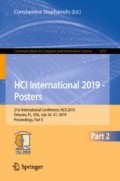Abstract
Virtual Reality offers developers an immersive and engaging new medium to create simulation applications, training tools, and educational games. One of the first decisions a VR developer will face is which platform to target. In 2014 consumer choice was limited to Google Cardboard. By 2016 this had expanded to six devices, including popular platforms such as Oculus Rift, HTC Vive, and PSVR. Today there are not only more platforms, but even more variation in platform hardware, input devices, and interaction methods. This overwhelming amount of variance can be daunting for developers who want to create a VR application where the goal is to develop and deliver for multiple platforms, typically to reach the largest audience. With applications in so many fields like medical, educational, and cyber security, it is becoming more important that VR experiences can run on multiple platforms in different environments. Therefore, we present and apply our approach to unify these differences with a platform agnostic framework for the Unity game engine that allows developers to focus on creating their vision, without worrying about individual SDKs and the intricacies of each platform.
Unity does a great job natively supporting the popular SDKs such as SteamVR and OculusVR, but these SDKs only apply to their own family of hardware, leaving the developer to re-write or even duplicate and alter code just so they can deploy their experience on multiple platforms. As project scope grows, this becomes more and more complex and can be a time-consuming task.
Access this chapter
Tax calculation will be finalised at checkout
Purchases are for personal use only
References
Dickson, P., Block, J., Echevarria, G., Keenan, K.: An experience-based comparison of unity and unreal for a stand-alone 3d game development course. In: 2017 ACM Conference on Innovation and Technology in Computer Science Education, Bologna, Italy, pp. 70–75 (2017)
Christou, C.G., Michael-Grigoriou, D., Sokratous, D.: Virtual buzzwire: assessment of a prototype VR game for stroke rehabilitation. In: 2018 IEEE Conference on Virtual Reality and 3D User Interfaces (VR), Reutlingen, Germany, pp. 531–532 (2018)
Ardulov, V., Pariser, O.: Immersive data interaction for planetary and earth sciences. In: 2017 IEEE Virtual Reality (VR), Los Angeles, CA (2017)
Sharma, S., Otunba, S.: Virtual reality as a theme-based game tool for homeland security applications. In: 2011 Military Modeling & Simulation Symposium, Boston, MA, pp. 61–65 (2011)
Schlueter, J., Baiotto, H., Hoover, M., Kalivarapu, V., Evans, G., Winer, E.: Best practices for cross-platform virtual reality development. In: Degraded Environments: Sensing, Processing, and Display 2017, SPIE 10197, Anaheim, CA, p. 1019709 (2017)
Forbes.com: Lamkin,’VR and AR Headsets to hit 80 million by 2021’. https://www.forbes.com/sites/paullamkin/2017/09/29/vr-and-ar-headsets-to-hit-80-million-by-2021/#6a4cc53824bc. Accessed 05 Jan 2019
ThinkMobiles.com, ‘Best virtual reality SDKs to build VR apps in 2018’. https://thinkmobiles.com/blog/best-vr-sdk/. Accessed 06 Jan 2019
Author information
Authors and Affiliations
Corresponding authors
Editor information
Editors and Affiliations
Rights and permissions
Copyright information
© 2019 Springer Nature Switzerland AG
About this paper
Cite this paper
Tynes, C., Seo, J.H. (2019). Making Multi-platform VR Development More Accessible: A Platform Agnostic VR Framework. In: Stephanidis, C. (eds) HCI International 2019 - Posters. HCII 2019. Communications in Computer and Information Science, vol 1033. Springer, Cham. https://doi.org/10.1007/978-3-030-23528-4_59
Download citation
DOI: https://doi.org/10.1007/978-3-030-23528-4_59
Published:
Publisher Name: Springer, Cham
Print ISBN: 978-3-030-23527-7
Online ISBN: 978-3-030-23528-4
eBook Packages: Computer ScienceComputer Science (R0)

